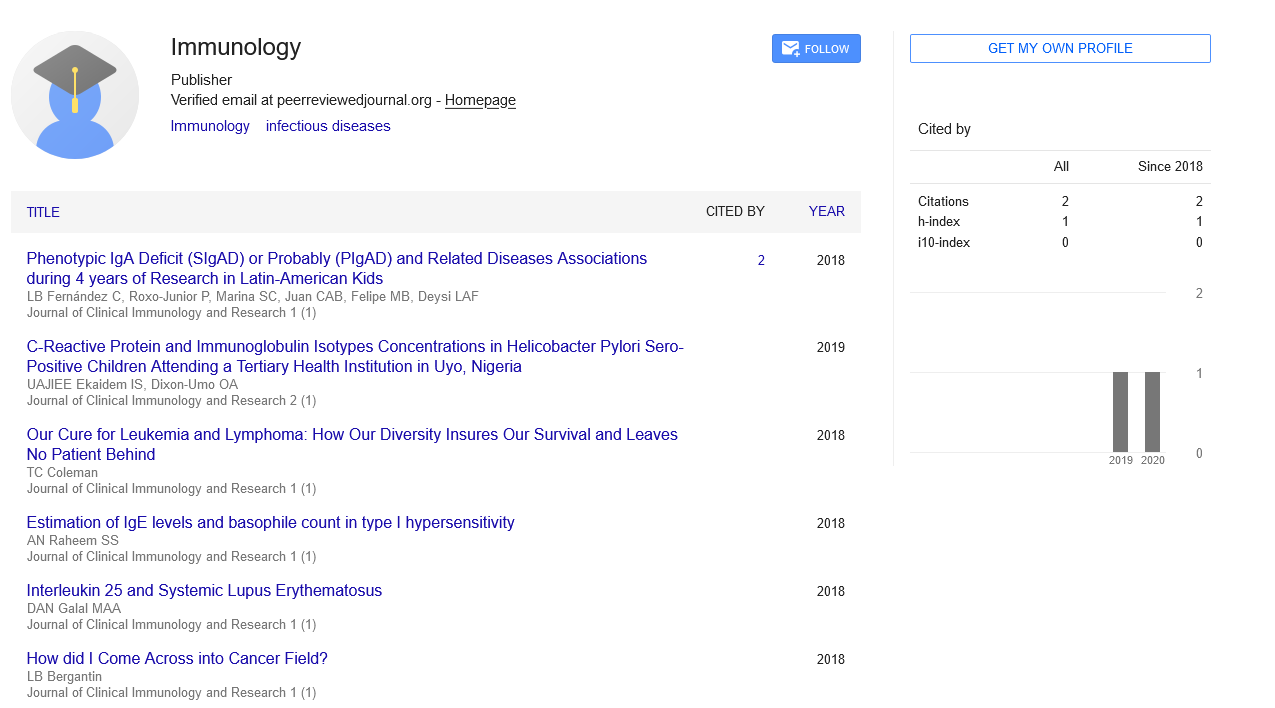Short Communication, J Clin Immunol Res Vol: 6 Issue: 2
Immune System Development for Tumor Treatment
Mikael Regan*
1Division of Gynecologic Oncology, Laval University, Quebec, Canada
*Corresponding Author: Mikael Regan,
Division of Gynecologic Oncology, Laval
University, Quebec, Canada
E-mail: reganmikael@gmail.com
Received date: 15 May, 2023, Manuscript No. JCIR-23-104713;
Editor assigned date: 17 May, 2023, Pre QC No. JCIR-23-104713 (PQ);
Reviewed date: 01 June, 2023, QC No. JCIR-23-104713;
Revised date: 08 June, 2023, Manuscript No. JCIR-23-104713 (R);
Published date: 16 June, 2023, DOI: 10.4172/JCIR.100076
Citation: Regan M (2023) Immune System Development for Tumor Treatment. J Clin Immunol Res 6:2.
Abstract
Description
Cancer continues to be one of the most challenging diseases to treat. The recent advancements in cancer research have revealed the tremendous potential of the immune system in combating cancer. The immune system, with its complex network of cells and molecules, plays a important role in recognizing and eliminating abnormal cells, including cancer cells.
Immune system's role in cancer surveillance
The immune system has an inherent ability to identify and eliminate abnormal cells, including cancer cells, through a process known as immune surveillance. Specialized immune cells, such as natural killer cells, cytotoxic T lymphocytes and dendritic cells, detect and eliminate cancer cells by recognizing specific antigens present on their surface.
Immune evasion by cancer cells: Despite the immune system's surveillance mechanisms, cancer cells can develop strategies to evade immune recognition and attack [1]. They may down regulate the expression of antigens, inhibit immune cell activation, or create an immunosuppressive microenvironment. These mechanisms allow cancer cells to escape immune detection and continue proliferating [2].
Cancer immunotherapy approaches: Cancer immunotherapy refers to treatments that harness and enhance the immune system's ability to target and eliminate cancer cells [3].
Checkpoint inhibitors: These drugs block the immune checkpoint proteins, such as programmed cell Death Protein 1 (PD-1) and Cytotoxic T-Lymphocyte-Associated protein 4 (CTLA-4), which are responsible for dampening the immune response [4]. By blocking these checkpoints, checkpoint inhibitors unleash the immune system, enabling it to recognize and attack cancer cells more effectively.
CAR-T cell therapy: Chimeric Antigen Receptor (CAR) T cell therapy involves genetically modifying a patient's T cells to express a CAR that specifically targets cancer cells [5].These modified T cells are then infused back into the patient, where they recognize and destroy cancer cells expressing the targeted antigen.
Cancer vaccines: Cancer vaccines aim to stimulate the immune system to recognize and mount an immune response against cancer cells [6]. Some vaccines contain specific tumor antigens, while others use dendritic cells or genetically engineered viruses to present tumor antigens to immune cells, triggering an immune response against the cancer cells [7].
Adoptive cell transfer: This approach involves isolating and expanding a patient's immune cells, such as Tumor-Infiltrating Lymphocytes (TILs), outside the body [8]. These activated immune cells are then reintroduced into the patient, where they target and destroy cancer cells.
Overcoming Immune Resistance: While cancer immunotherapy has shown remarkable success, not all patients respond equally to these treatments [9]. Ongoing research aims to understand and overcome immune resistance by exploring various strategies, including combination therapies, personalized treatments, and novel immune targets [10].
Conclusion
Harnessing the power of the immune system in cancer treatment represents a paradigm shift in oncology. By targeting cancer cells specifically and activating the body's own defenses, immunotherapy offers new hope for improved outcomes and long-term survival for cancer patients. Continued research and clinical advancements hold the promise of further unlocking the potential of the immune system in the fight against cancer.
References
- Martinez I, Chandel NS (2021) Cancer metabolism: Looking forward. Nat Rev Cancer 21: 669-680.
- Xia L , Oyang L, Lin J, Tan S, Han Y et al. (2021) The cancer metabolic reprogramming and immune response. Mol Cancer 20: 28-29.
- Singer K, Kastenberger M, Gottfried E, Hammerschmied C , Büttner M et al. (2011) Warburg phenotype in renal cell carcinoma: high expression of glucose-transporter 1 (GLUT-1) correlates with low CD8+ T-cell infiltration in the tumor. Int J Cancer 128: 2085-2095.
- Brand A, Koehl G , Kolitzus M , Schoenhammer G , Thiel A. et al. (2016) LDHA-associated lactic acid production blunts tumor immunosurveillance by T and NK cells. Cell Metab 24: 657-671.
- Lv H, Jiang G, Ye D, Cui X , He Y et al. (2021) NAD+ metabolism maintains inducible PD-L1 expression to drive tumor immune evasion. Cell Metab 33: 110-127.
- Tam S , Law H (2021) JNK in tumor microenvironment: present findings and challenges in clinical translation. Cancers 13: 2196.
- Steggerda S, Bennett M, Chen J, Emberley E , Huang T et al. (2017) Inhibition of arginase by CB-1158 blocks myeloid cell-mediated immune suppression in the tumor microenvironment. J Immunother Cancer 5: 101.
- Allard D, Buisseret L, Stagg J (2020) The adenosine pathway in immuno-oncology. Nat Rev Clin Oncol 17: 611-629.
- Leone R, Emens L (2018) Targeting adenosine for cancer immunotherapy. J Immunother Cancer 6: 57.
- Linneman C, Schildberg F, Schurich A , Diehl L, Hegenbarth S et al. (2009) Adenosine regulates CD8 T-cell priming by inhibition of membrane-proximal T-cell receptor signalling. Immunology 128: 728-737.
 Spanish
Spanish  Chinese
Chinese  Russian
Russian  German
German  French
French  Japanese
Japanese  Portuguese
Portuguese  Hindi
Hindi 